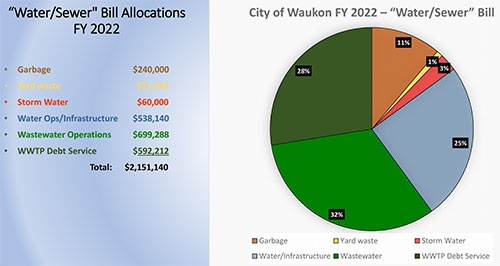You are here
Home ›Waukon City Manager breaks down water/sewer bill revenue allocations, provides updates on variety of projects and other matters involving the City

by Joe Moses
Waukon City Manager Gary Boden provided an update to The Standard Friday, January 29 relating to a variety of matters including Fiscal-Year 2022 water/sewer bill allocations, planning related to street improvement projects and grant opportunities being pursued by the City of Waukon.
Boden discussed specifics relating to the Fiscal-Year 2022 (FY22) use of water/sewer bill revenue and provided a pie chart (accompanying this article) illustrating the percentages and dollar amounts of this revenue used in funding necessary City operations and needs. Boden pointed out that 28% of this revenue is designated for the new Wastewater Treatment Plant’s debt service, with that project to come in at an approximate total cost of $12.3-12.5 million. Boden added that this is a mandated project from the State and Federal government with the project’s expense resulting in a water/sewer utility bill increase of 25% in comparison to what it was four years ago.
Boden further explained that the 28% Water/Sewer bill allocation, or $592,212, designated for this debt service will increase to approximately $650,000 starting in Fiscal-Year 2024 (FY24). He noted that $1 million in borrowing will provide the remainder of the project’s financing.
Boden added that there have been programmed rate increases established to help finance the new Wastewater Treatment Plant project starting with 40% increases for two consecutive years, 30% in the current fiscal year and, lastly, a 15% increase in the upcoming fiscal year, with a three percent annual increase also programmed in moving forward to help fund the maintenance and operations of the new facility.
As indicated in the pie chart, 32%, or $699,288, has been designated for Wastewater Operations which Boden described as being an estimate with the first year of the new Wastewater Treatment Plant’s operation involving some variables and unknowns relating to new energy and chemical needs. Boden said that a greater understanding of the new Wastewater Treatment Plant’s operations and associated costs will be achieved after the first year of operation. Boden summarized that the pie chart illustrates that 60% of the Water/Sewer bill revenue will go toward the new Wastewater Treatment Plant with approximately half of that being for debt service and the remainder funding wastewater operations.
Boden discussed the Garbage portion of the water/sewer bill at 11%, or $240,000, which is provided to Town & Country Sanitation for that company’s garbage collection services. Other portions of the water/sewer bill include the 25%, or $538,140, designated for Water Operations/Infrastructure expenses, three percent, or $60,000, as a storm water fee, and one percent, or $21,500, designated for yard waste disposal site expenses.
Boden transitioned into discussion of a storm water project involving a piece of storm water sewer tile which he described as being the last of several recent sewer main projects. Boden said that this project on First Avenue between Second and First Streets NW will cost between one-third to a half million dollars to complete. Boden also discussed maintenance of the storm water retention basin located in the northwest section of Waukon with another property located on First Street SW being purchased by the City as a location for a smaller storm water retention area.
Boden provided a brief update relating to the Waukon Police Station remodeling project. He advised that the building’s light fixtures have been on back order resulting in some delays, but once installed, the remaining interior work will move quickly with some exterior work to be accomplished later in the year as weather allows.
Boden said that discussion will be taking place in the near future relating to street projects to take place this year and what opportunities are available for street improvements in the coming years. A special meeting was suggested by Boden as a possibility for this discussion or inclusion of an agenda item during upcoming regular sessions, which may include identifying and prioritizing where street improvements are needed and to determine which finance options would fit the City’s needs.
Boden advised that approximately $490,000 annually is designated for the Street Improvement Fund predominantly coming from Local Option Sales Tax (LOST) revenue, which is required by ordinance to be spent on street improvements. Less the $75,000-$85,000 spent annually on chip sealing, Boden noted the remaining $400,000-plus in yearly revenue represents an opportunity, with additional financing, to complete some major street improvement projects over the next decade.
The replacement of an ambulance for Veterans Memorial Hospital (VMH) was discussed, with Boden advising that ambulance service is not considered an essential service by the State of Iowa and, as a result, townships do not have unlimited tax authority to generate revenue for this type of expense, which may represent a significant challenge from a financial planning standpoint to townships. Boden advised that the City of Waukon’s ambulance contribution was previously budgeted at $5,500 annually, but will increase to $20,500 the next two years, with other expenses on the horizon also being budgeted for including a fire truck for the Waukon Fire Department.
Boden provided an update relating to grant applications prepared by Waukon City Clerk Sarah Snitker on behalf of the City. Boden advised that one such grant application submitted to the Allamakee County Community Foundation may provide funding for 11 automated external defibrillators (AED) with three to be placed in Police Department patrol vehicles, two as replacements at the Wellness Center, with individual AEDs to be placed in the Police Station, Robey Memorial Library, City Hall, and in the City’s Street Department building, Water and Sewer Department building and in a Water and Sewer Department vehicle.
Boden briefly discussed another grant application to be prepared by Snitker for the Derelict Building Grant Program offered through the Department of Natural Resources (DNR) which, if awarded, would benefit the former Tierney’s/JCPenney building’s facade improvements as part of that remodeling project and conversion into a proposed steakhouse restaurant.

